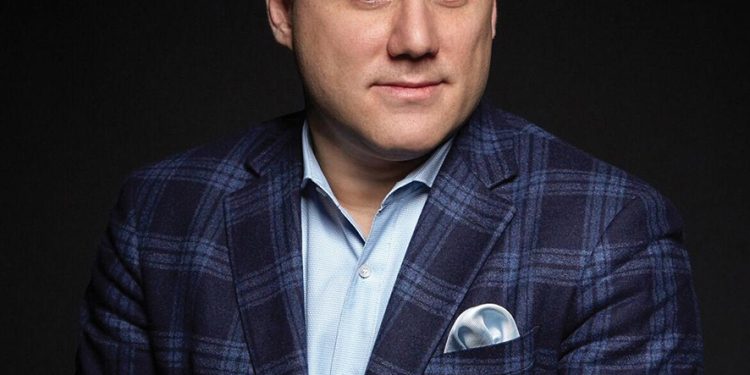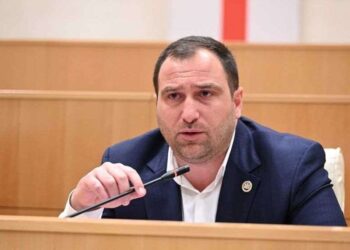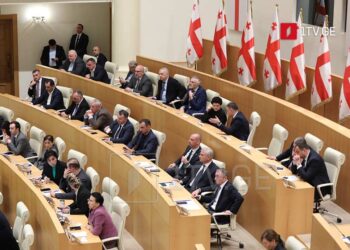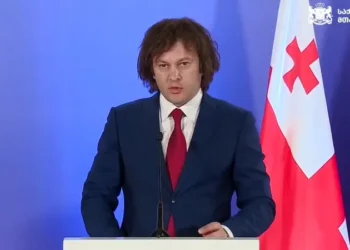Dmitri Alperovitch is a Soviet-born cybersecurity expert and entrepreneur who has waded deeply into geopolitics. A co-founder of CrowdStrike, who helped investigate high-profile cases, including the Russian hack of the US Democratic Party in 2016. He also launched the Silverado Policy Accelerator, a nonprofit think tank, to examine US policy challenges in the 21st century.
Alperovitch spoke to RFE/RL’s Georgian Service after the crash of Wagner founder Yevgeny Prigozhin’s private jet on August 23. He talked about what Prigozhin’s demise says about President Vladimir Putin’s “gangster state,” the chilling message it sends, and its likely effect on events in Africa and the war in Ukraine.
Prigozhin might have sung his own aria already, but what about the Wagner opera itself?
I think the Russian military would love to have the Wagner folks, both the commanders and individual infantrymen, join up and sign contracts either directly with the Russian military or through one of their cutout PMCs [private military companies], like Redut, for example, that the Russian military organized a few years ago. And, in fact, Putin personally made the case to them a week after the mutiny when he met with about 30 Wagner commanders and Prigozhin himself, in the Kremlin, as he himself claimed, and tried to push them to abandon Prigozhin and sign up. And according to his telling, they were all ready to do so, if not for Prigozhin, who said, speaking for them, that they did not want it.
What might have made Prigozhin think he could escape punishment?
This goes to the issue of why he was [allegedly] killed, and I do not buy the argument that this was simply revenge for the mutiny. I do think that there was a deal that was made after the mutiny, where he was going to be forgiven for this act of “disobedience.” But it was going to be on Putin’s terms, and one of those terms is that he was going to go away. Exile to Belarus was not really about Belarus as much as about Prigozhin disappearing into the night. And he decided not to do that.
And this latest confrontation about Africa was the straw that broke the camel’s back, where Putin sat back and said: “Wait a second, not only does this guy get away with mutiny, and I gave him his life back and guaranteed his safety, but now he dares to challenge me? The payment for the mutiny was that I’d take away your business, and give it to myself and my cronies. And you dare to resist that? That’s it. You’re done.”
So, Prigozhin reneged on a pardon that was given to him?
Yeah, I don’t know that he knew exactly that he was reneging on it, because I’m not sure that the deal that he got specified all those details. But certainly, in Putin’s mind, it was a complete capitulation, and that whatever conditions that Putin put forward, even if he didn’t mention Africa originally, but if he decided later on at some point he was going to take Africa away from Prigozhin, that Prigozhin’s job was to say, “Yes, sir,” and oblige. And Prigozhin dared again to obstruct, to fight back, and that was unacceptable.
Speaking of Belarus, we should probably mention the great mediator, Belarusian leader Aleksandr Lukashenko. He’s had an almost Shakespearean role in all this. How does it look from your perspective?
I don’t think he was some great negotiator here. I think he was a messenger boy. Because Putin, clearly, at the time of the mutiny, was uninterested in talking directly with Prigozhin. Prigozhin wanted to talk to Putin directly and explain, because I think Prigozhin got very scared during that episode that Putin was interpreting it as a challenge to his rule, which I don’t think Prigozhin ever intended it to be.
I think Prigozhin was very misguided in that he thought he could drive an armored column to Moscow and still be friends with Putin, and just, you know, ask for the resignations of Defense Minister [Sergei] Shoigu and Chief of the General Staff [Valery] Gerasimov. But Putin obviously didn’t take it that way, and he was livid. And Prigozhin was trying to make amends, and Lukashenko was the one guy that could talk to both of them and pass the messages along. So that’s the role he played.
The Belarus scenario of “Wagner goes to Belarus” never really made much sense. I think it was really much more of an exile for Prigozhin and Putin sort of waving him away and saying: “OK, I will forgive him, I’ll let him live. He just needs to go away.” Where he went, I don’t think Putin really cared a whole lot. But when Prigozhin, instead of going away, decided to keep challenging the Russian system and the Russian government, that’s when he signed his own death warrant.
Speaking of Shoigu and Gerasimov, can they breathe a sigh of relief now, or is it still murky waters for them?
I don’t think they’re breathing a sigh of relief- I think they’re toasting life with champagne glasses right now. Because not only did they have their rival eliminated, but it’s also very, very sweet revenge, right? After all, even though Putin took it as an affront to him personally that there was this march toward Moscow, that was really the only thing that Prigozhin ever did to Putin. But with Shoigu and Gerasimov, he was vicious to them in all of his videos and public statements, making fun of them, and trolling them nonstop. So, to say that they had no love lost for him is a massive understatement.
The actual [alleged] execution, the manner of it, was very sensationalist, right out of mafia and Hollywood movies. They could have chosen many other methods, but they [allegedly] opted for this. What’s the message there?
That’s hard to tell. I’m not sure that Putin was actually micromanaging the means of [an alleged] execution. I think he most likely gave the order to go do it, and his underlings, most likely the FSB (Federal Security Service), that [allegedly] carried it out, decided on the means. And that probably was related to how to get to Prigozhin, given that he is very paranoid and he has a lot of security. Killing him in Africa would have been very challenging, given that he was surrounded by mercenaries; killing him in Moscow, when he was always traveling with significant security, was also going to be very challenging. So, it actually made sense to try to orchestrate an “accident in the air.” That may have been simply the easiest way to get it done.
And it also probably has a little bit of a poetic justice in their minds, because, after all, not only did Prigozhin march on Moscow, but in the process, he shot down a number of Russian aviators and killed them. So, to have him die the same death, falling out of the sky, has a certain ring to it that I’m sure certain people in Moscow, if not Putin himself, would appreciate.
When the Prigozhin mutiny happened, there was lots of talk that “Putin is weakened,” or “his grasp on power is weakening,” etc. Has he shown Russia and the wider world who is boss?
Yes, he has. I think he has reestablished, for now, at least, his hold on power. I think he sent a clear message that “My enemies tend to die. Never forget that.”
Even if it takes two months for them to do so.
Yes, yes. In fact, that’s even better, right? That you never know when the Sword of Damocles is going to strike you. But I think Putin’s geopolitical issues actually got worse, because this rush for Africa is going to be very challenging for him. Prigozhin was not just the CEO of this business empire, he was a really phenomenal organizer, quite entrepreneurial, and an inspirational leader to his people. Even though he was a brutal thug, he learned how to rule by both fear and inspiration. He had a lot of connections with all of these leaders across the continent that were personal in nature that will be hard to replicate and will certainly take time.
It’s unclear what’s going to happen to Wagner. Some of these people may decide to sign on and work with the Defense Ministry, some of them may just decide, “You know what, I’m done here. I liked working for Prigozhin, but I’m just going to go home now and cash in my chips.” So, this is going to be a challenge for them to actually rebuild what Prigozhin had constructed, in terms of this whole system in Africa, and it will certainly take time and will not be without problems.
Wagner, as an assault force that Prigozhin had built and used successfully in Ukraine to take Bakhmut, is also now done. And to the extent that Putin could have used Wagner again in future offensives in Ukraine, that’s going to be much more difficult for him and probably less likely to happen.
So, yes, he has taken out a rival who dared to challenge him. Yes, he has taken over that rival’s business interests. But his geopolitical strategic interests, resolving the mess that he got into with this war in Ukraine and increasing his influence in Africa, have actually not improved as a result of this action.
What are the implications for Ukraine after Prigozhin?
I’ve had a lot of conversations with a range of officials in Kyiv since the mutiny in June but also since Prigozhin’s death. And, actually, their reaction is really interesting: It’s sort of taking out the popcorn and enjoying the show, but also appreciating that it really has very little relevance to their current fight.
Wagner is out of Ukraine, of course, and has been out of Ukraine since early June, so what’s taking place right now with this counteroffensive, Wagner is not involved at all. So, regarding what happens to Prigozhin, people in Kyiv somewhat pay attention to it, but not a whole lot, because they’re preoccupied with their own concerns and they know that this episode really has very little effect on their lives going forward.
There are two things that they can draw from it. That, one, Wagner as it existed under Prigozhin really has ended, and that’s a positive for Ukraine, frankly, a positive for the world, because whatever form it continues in, if it continues, it will not be the same, and it will not be as effective as it was under Prigozhin. I think that is very clear. But, two, it also shows that Putin’s word can’t be trusted. This is the guy who guaranteed Prigozhin’s safety, and for whatever reason, he chose to renege on that word.
One might argue that Ukrainians knew his ways already, even without Prigozhin.
The Ukrainians certainly know it. But there are a lot of people in Europe and elsewhere who keep talking about the prospect for negotiations. And I keep getting asked whenever I visit European capitals: “When are they going to finally start?” And my response to them is: “Who are you negotiating with and what do you think you can get from Putin, first and foremost, and what do you think you can get from him that you can actually trust?” And I think that’s going to be a message from the Ukrainians going forward: that this is not a guy that can be trusted and don’t keep pushing us to negotiate with him.
The world press had a field day writing about this, replete with all sorts of references, starting from classical literature and ending with pop culture and mafia movies. Even The Wire got a mention. What do you think would be a fitting epitaph for Prigozhin?
Well, I actually think that the whole episode is perfectly reflected by the Godfather scene where Michael Corleone says, “It’s not personal, Sonny, it’s strictly business.” That’s what I think actually happened here. Putin did know Prigozhin, as he said, for many, many years, going back to the early 1990s; there’s some indication they may have had some intersections around casinos that Putin was responsible for granting licenses to in his early days in St. Petersburg, and he’s certainly run into him on a number of occasions over the years.
I think [Putin] probably did not relish the idea of killing Prigozhin. I think a lot of people assume that he’s this guy that is almost a caricature of a bloodthirsty tyrant that just assassinates people for fun. I don’t think that’s the case at all. I think he doesn’t mind killing people if he thinks that it advances his goals, but I don’t think he particularly enjoys it. And I think he probably wishes that he hadn’t [allegedly] had to take this route, that it hadn’t come to this.
But it was business. And, you know, the one thing you cannot do is interfere with business interests in a mafia state, which is what Russia is today. It is not just a dictatorship, an authoritarian system; it literally is a gangster state that Putin has created, and it lives by gangster rules.
Interview by Vazha Tavberidze














